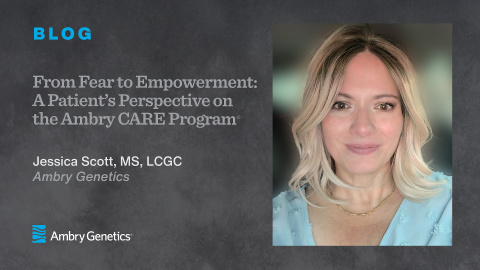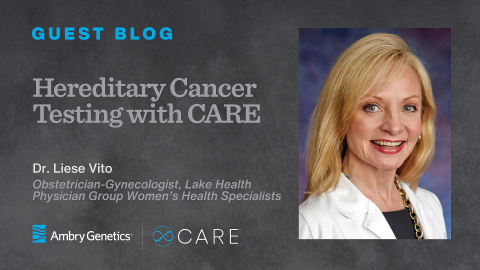- By Jessica Scott, MGC, CGC
- Posted January 15, 2025
From Fear to Empowerment: A Patient's Perspective on the Ambry CARE Program
We talk about the Ambry CARE Program® (CARE) a lot – how it helps providers identify high-risk patients, offers genetic testing and genetic counseling at scale, and gives patients insights to help them better manage their health. All of that is very powerful, but people also often ask what CARE looks like from the patient’s perspective.…
- By Liese Vito, MD
- Posted January 24, 2024
Hereditary Cancer Testing with CARE
According to studies, 93% of high-risk women who qualify for breast MRI have not had one.1 97% of women at risk for hereditary breast/ovarian cancer have not had genetic testing.2 These healthcare gaps mean high-risk patients are being missed when it comes to proactive and preventative care. As a practicing OB-GYN for twenty years, I have seen…
- By Ambry Genetics
- Posted February 14, 2019
February is National Cancer Prevention Month
February is National Cancer Prevention Month Since cancer touches so many lives, it is fitting that an entire month is dedicated to building awareness of the many strides being made in unlocking its secrets. Every day, more is discovered that enables earlier and more accurate risk assessment, detection and precise treatment. One of the most difficult…
- By Jessica Profato, MS, CGC
- Posted June 8, 2018
I Survived Cancer, so Why do I Need Genetic Testing for it?
As a clinical genetic counselor, I saw many cancer survivors for genetic counseling. In some cases, it had been 30-40 years since they were diagnosed. Some of them were in their 60s-70s when I saw them, but they were young at the time of their cancer diagnosis. Years later, they were referred to me to talk about the possibility that their history…
- By Tiana Adams, PA-C, MBA
- Posted July 7, 2016
You Need to Know These: Signs and Symptoms of Breast Cancer
My name is Tiana Adams, and I am a practicing Physician Assistant with 18 years of clinical experience. During this time I have worked in many specialties, including Family Practice, Urgent Care, Occupational Medicine, Orthopedics and Breast Cancer Surgery. Currently, I am the Oncology Operations Specialist at Ambry. Moving into this role is something…
- By Carin Espenschied
- Posted June 22, 2016
Decisions, Decisions: What To Consider When Deciding On Risk Reducing Surgery
If you have been diagnosed with an inherited colorectal cancer syndrome, your healthcare provider may have recommended that you consider having risk reducing surgery. Risk reducing colectomy is the removal of part (partial colectomy) or all (total colectomy) of the colon to reduce the risk of developing future cancer. Risk reducing hysterectomy…
- By Theresa Smith
- Posted April 7, 2016
What Can I Do Until My Children Can Be Tested?
Dealing with your own BRCA1 or BRCA2 genetic testing results is one thing, but worrying about testing for your children is another. Especially when they are under 18 years old. There is a very real possibility that people will have to wait for years for their kids to find out if they are positive or negative for the mutation.…
- By Theresa Smith
- Posted March 22, 2016
Hang on a Minute, Let’s Think This Through
After testing positive for a mutation in my BRCA2 gene, I was on high alert. I rushed to all my doctor’s appointments and gathered a lot of information regarding preventive surgery options. I also did a lot of research on the statistics and newer medical studies regarding BRCA1 and BRCA2. I evaluated everything based…
- By Eve Mart
- Posted March 1, 2016
Being a Survivor Doesn’t Mean You Can Ignore Me
My mom was first diagnosed with breast cancer in 1989, when breast cancer was still whispered about and long before Angelina Jolie put genetic testing on the Hollywood map. My mom complied with the treatment recommended for her at the time, which included a lumpectomy, chemotherapy and radiation. Eighteen years later, in 2007, I was 34 years old…
- By Theresa Smith
- Posted February 23, 2016
What about my “foobies” surgery?
I did finally come to terms with my decision to have a preventive bilateral mastectomy to lower my risk of breast cancer from my BRCA2 gene mutation. I was scheduled with my surgeon, but I was put on a rolling schedule, which meant my date was not set in stone. I asked at what point I got to keep my surgery date, instead of my date being…









